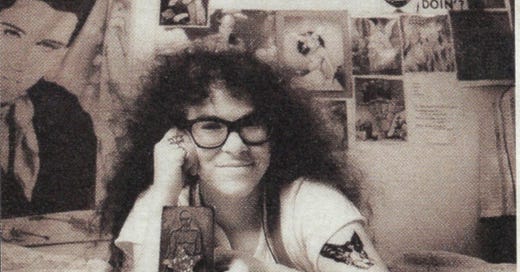In honor of today’s Dyke March in NYC, I’m posting my interview with one of the East Village’s fiercest “Dykes to Watch Out For,” stage manager and activist and community treasure Lori E. Seid. This was first published in Interview magazine in 1990.
LORI E. SEID: STAR TECH
Lori E. Seid has no official title at Performance Space 122, but she can often be found crouching in the aisle wearing a headset, waving at friends from the sound booth, or circulating in the lobby, greeting people like an ad hoc host. This tough-looking gal with big hair and owlish specs is a stage manager extraordinaire, and production manager and tech director of Field Trips, P.S. 122’s touring round-robin of performance art. Lately, Seid has also taken on a new role – as M.C., first for an evening of lesbian vaudeville and disco dancing called Salon de la Mer and then for Cine Club Salon, an evening of old-fashioned moviegoing complete with cartoons, Milk Duds, and dancing girls.
But it’s as all-purpose guardian angel for the community of performers she works with that Seid has carved out the strongest niche for herself. One of my most electrifying experiences in the theater was the opening night of Karen Finley’s A Suggestion of Madness, which ended with Finley reading her father’s suicide note. A few sentences into that harrowing document, the performer broke down. A packed house looked on, figuring this was part of the act, until Seid appeared and with inutterable gentleness helped Finley offstage, ending the performance.
Seid and I met at her funky studio apartment, the walls of which were lined with festive posters of female stars.
Were you trained in theater?
No, I’m a college dropout. I was a photography major at School of Visual Arts for about three years, stood up one day and said, “This is bullshit. I’m sorry. I can’t do this.” And I just left, never cleaned my locker. Then I did one weird job after another. I ran the giant arcade at Penn Station for about two years. That was probably where I learned most of my street smarts.
How did you get to P. S. 122?
By accident. A friend of mine was rehearsing there, and when I asked where she was going for six hours every day, she said, “Why don’t you come along and see?” Now, I’m not someone who just sits. If things have to get moved or schlepped or put up or put down, I will help out. Before I knew it I was getting work. I was twenty-four. I had no idea of what performance art was or anything. Then I saw Karen Finley’s show at P.S. and my life changed. I became a fan, and I pretty much said, “Do you need help?” She’d never had a tech person, and she said, “Well, I don’t know.” She had a bunch of gigs lined up, and I would just show up.
And do what?
Anything that needed getting done. A slide projector needed running, a tape needed to be turned on at a certain moment, a set change needed to happen, a curtain needed to be hung. Very common-sense stuff. Then, when I got into the community, other people would need stuff done, too. My idea was, “You teach me how to do it, and I won’t charge you.”
You’re so intimately involved with what’s going on onstage. Do you feel like a performer?
Not really. What makes me feel part of it is almost a spiritual quality. That might sound stupid, but it is.
It’s not stupid, but it’s hard to talk about spirituality these days.
I don’t have trouble talking about spirits, because I feel really guided by them. The more people we keep losing, the more they take care of us. I helped take care of [dancer] John Bernd for a long time while he was dying. He was one of the first people diagnosed with AIDS. The man was sick for eight years. He really taught me a lot about life by sharing his death. And I don’t think that spirit ever leaves.
How do you like being an M.C.?
I love it. When I was a kid I always wanted to be a television personality.
You wanted to be on Hollywood Squares?
Not that so much. No, I like chatting with people.
Like Merv Griffin.
Yeah, or Mike Douglas. I used to watch Mike Douglas every day at four o’clock after school.
Can you see yourself doing production and stage managing in ten years?
Yeah. I want to do it at a little bigger level. My big dream is a Fresh Air Fund for artists. I’d like to open a residence for artists in Sevilla or Seattle, some really natural setting. It’s only when you travel you remember there are stars in the sky, things like that. When you’re in a theater, you’re really focused, you’re in that mode, and what you’re doing is really important. But so is looking at stars in the sky.
If you are enjoying these posts, please consider becoming a subscriber. All eyes are welcome, and I especially appreciate paid subscriptions. They don’t cost much — $5/month, $50/year — but they encourage me to continue sharing words and images that are meaningful to me. If it helps, think of a paid subscription as a tip jar: not mandatory but a show of appreciation.





A superhero. Thanks.